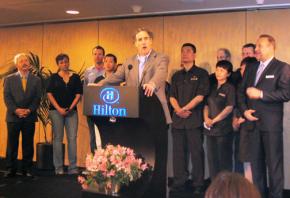Why Hilton finally conceded
UNITE-HERE members at Hilton Hotels in six cities have approved a long-term deal, reports , a former president of IAM Local Lodge 1781 in California.
ALL OF us at one time or another had things pounded into our heads so often that ultimately a light bulb goes off. Finally, one or more of our experiences, good or bad, influences our behavior.
This is not new. The esteemed 19th century philosopher Soren Kierkegaard had a penchant for quotable parables and said it this way: "Life can only be understood backwards; but it must be lived forwards."
You might say this is exactly what happened to management at Hilton Hotels, which is owned by the private equity Blackstone Group. After years of strikes, picket lines and boycotts haunting the industry, Hilton decided all the strife was bad for business.
The result is a long-term agreement extending to August 2018 between Hilton and hotel union UNITE HERE. It covers six cities, including San Francisco, Chicago, Boston and Toronto.
"I'm very pleased with the settlement," said Guadalupe Chavez, a room attendant at the Hilton San Francisco Union Square and executive board member of San Francisco's UNITE HERE Local 2. "We are happy to know that our health care and wages are secured for the next five years."

The settlement does indeed provide fully paid medical insurance, no small achievement these days. It also strengthens job security in case of a hotel sale--and in the worst-case scenario, if bankruptcy looms, the union can protect those rights by striking.
Job security and health care were the two most important concerns of Local 2 members, who enthusiastically approved the contract by a 99 percent margin.
In addition, annual compensation increases of 4 percent will be distributed between wages and benefits as decided by the union negotiating committee. This is somewhat unusual for the union, but warranted, according to Local 2 president Mike Casey, "because of the uncertain costs associated with the Affordable Care Act."
In remarks to a March 25 press conference, Hilton general manager Michael Dunne greeted the settlement as a breath of fresh air. "It is good for our hotel, our team members and the city of San Francisco," he said.
San Francisco Mayor Ed Lee also chimed in, congratulating Dunne and Casey for "setting a standard for our city's hotel industry, keeping San Francisco's economy vital and supporting working families in the Bay Area."
IT'S SAFE to say both were very relieved that there will be a break from marches, rallies and boycotts for the next five years, at least at the Hilton. But the union is not sitting still. The Hilton contract is now the standard. "Over the coming weeks and months, we will begin talks with the rest of the union employers and hope to quickly reach the same agreement," Local 2 spokeswoman Julia Wong told me.
Now what?
Room attendant Guadalupe summed up Local 2's stance at the press conference by saying, "We are now ready to realize our vision to organize other hotel workers because they have a right to these same benefits."
With Mayor Lee and general manager Dunne looking on, a message was sent to both union and nonunion hotels in the area. It was stressed again and again by Local 2 members.
"We are ready to stand with others to make our union stronger," said a Hilton doorman with 22 years experience. A housekeeper with 14 years added, "We can now take the time to organize to make us stronger."
It is clear that members have been prepared to launch a massive organizing drive now that they have a won a five-year contract. And there are plenty to choose from with tens of thousands of nonunion hotel workers in Northern California lacking affordable family health care, pensions and living wages.
"By settling contracts early with union employers like Hilton," Wong emphasized to me, "we hope to have a clear path to embark on organizing, starting with our current fights for nonunion workers at Hyatt [with the worst safety and employee relations' record of them all] and HEI."
To improve conditions in the hotel industry, we must reach out to both union and nonunion workers, the union says. And they are doing just that.
In early April, hundreds of San Francisco hotel workers will engage in a week of action against Hyatt, with pickets at the Grand Hyatt Union Square, Hyatt Fisherman's Wharf and Hyatt Regency Santa Clara.
So while Hilton management can now sigh with relief for the next five years, those taking the Hyatt route--or "low road," as Casey describes it--don't seem to be in for relief any time soon.


